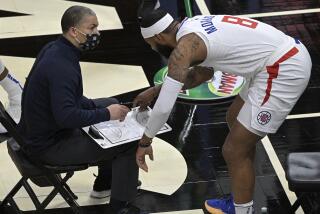BODY WATCH : It Takes a Lot of Nerves to Make Practice Perfect
- Share via
Practice makes perfect--but how?
For complex skills like playing the piano or serving a tennis ball, practice actually increases the area of the brain involved, perhaps by stimulating recruitment of additional nerve cells to help with the task being learned.
That is the conclusion of a study by neurologist Dr. Avi Karni and colleagues at the National Institute of Mental Health, published recently in Nature.
The team studied images of the brain at work, using a technique called functional magnetic resonance imaging that shows activity of specific brain regions, as reflected in changes in blood flow.
Six male subjects, 24 to 44 years old, were told to touch different fingers of one hand to the thumb in a specific sequence. The researchers tested their speed and accuracy. Then, while the subjects carried out the task, the scientists took MRI images of a brain region called the primary motor cortex that controls voluntary movement.
The men practiced the sequence daily for 20 minutes. Their brains were imaged weekly as they performed the task. After about three weeks, their performance speed had doubled, and MRI images showed that a substantially bigger area of motor cortex was being activated during the exercise.
Karni said the study is the first to show such functional changes in the human brain during long-term learning.




